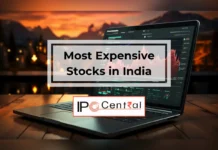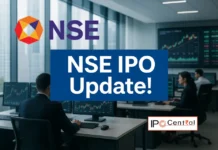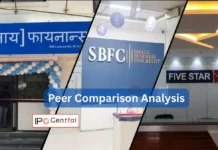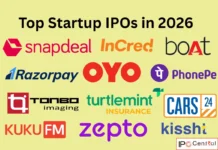Amidst a shifting landscape in India’s value retail and FMCG ecosystem, ICICI Securities has maintained its bullish stance on Vishal Mega Mart (VMM), issuing a reaffirmed ‘BUY’ rating with a target price of INR 140 per share, translating to a 32% potential upside from the current market price of INR 106 per share. The brokerage’s optimism stems from VMM’s differentiated private label model, operational resilience, and scalable cost structure—elements that position the company favorably in India’s growing yet fragmented value retail space.
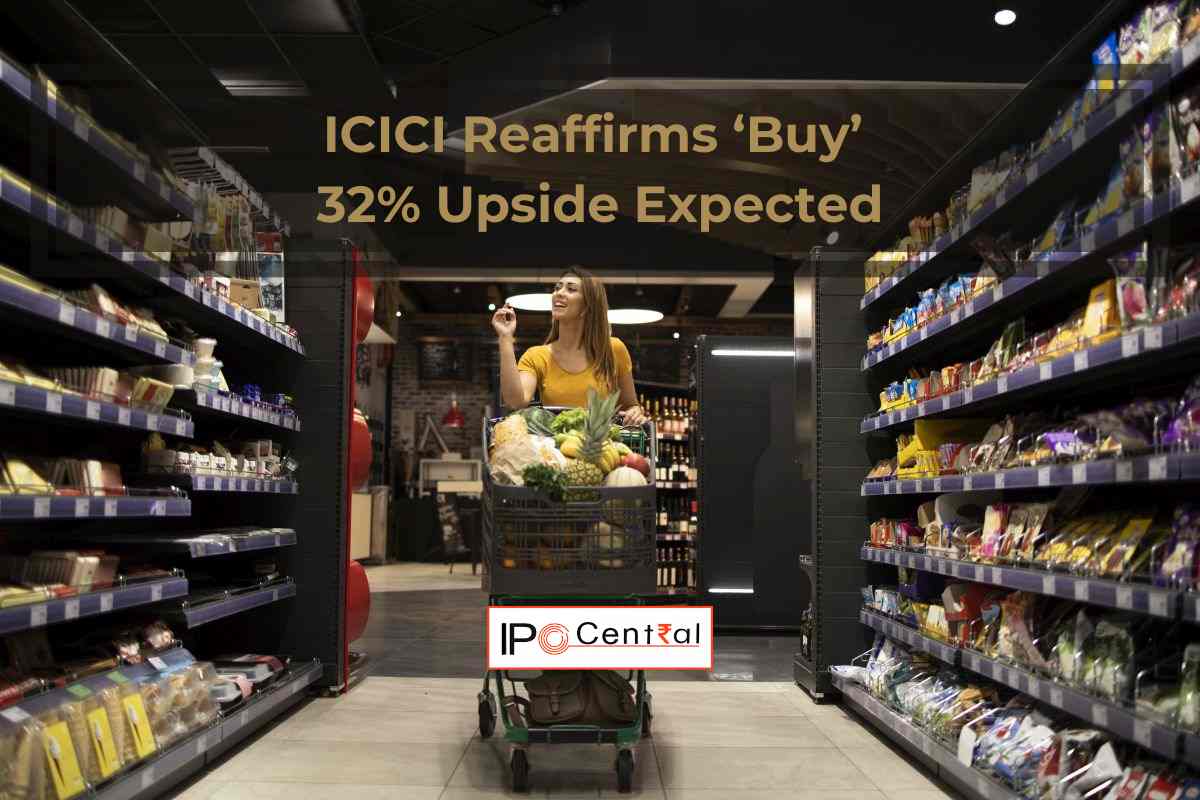
The Crux: A Private Label Powerhouse in the Making
Unlike most of its value retail peers, Vishal Mega Mart has made its private label strategy not just a side bet but the core of its operational and brand philosophy. As per ICICI Securities’ latest company update dated 7 April 2025, private label products contribute to ~27% of VMM’s revenue, with a staggering 73% SKU salience across categories, ranging from food essentials to personal care and household cleaning products.
Where most retailers are treading lightly with own-brand items, VMM has doubled down, backing its strategy with a meticulous approach to quality, pricing, and vendor partnerships. And the results speak for themselves.
Key Manufacturer Partnerships
ICICI’s research reveals a list of highly reputed manufacturers supplying to VMM’s private labels:
- Coffee: ‘Full Bloom’ by CCL Products, the largest exporter of instant coffee from India.
- Tea: ‘First Crop’ by Goodricke, India’s second-largest tea producer.
- Biscuits: Manufactured by United Biscuits, part of Pladis Global (makers of McVitie’s).
- Namkeen: Produced by Bikanervala Foods.
- Noodles: Sourced from Indo Nissin, inventors of instant noodles (Top Ramen).
- Honey: From Apis India, a known brand in the domestic market.
These collaborations allow VMM to offer branded-quality products at value prices, solving the common private label concern—quality compromise. As ICICI notes, these tie-ups ensure “end-to-end product lifecycle management” including design, sourcing, and quality control.
Price Advantage
VMM’s pricing strategy is razor-sharp. An exhibit from ICICI Securities’ report compares prices between VMM’s private labels and leading national brands. The differences are not marginal—they are disruptive:
| Category | Brand | MRP (₹) | Price (₹) | Discount (%) |
|---|---|---|---|---|
| Tea (1kg) | Tata Tea | 540 | 349 | 35.4% |
| Tea (1kg) | Full Bloom | 540 | 230 | 57.4% |
| Coffee (25g) | Bru | 125 | 125 | 0% |
| Coffee (25g) | Full Bloom | 119 | 60 | 49.6% |
| Noodles (420g) | Maggi | 84 | 78 | 7.1% |
| Noodles (420g) | First Crop | 104 | 52 | 50.0% |
Such aggressive pricing, while maintaining quality, directly appeals to VMM’s core customer base—middle-income households in Tier 2/3 cities, where every rupee saved matters. This strategy isn’t just winning sales—it’s building trust and repeat buying behavior.
Financial Trajectory
VMM is growing not just fast, but profitably and predictably. Key metrics from ICICI’s forecast (FY24–FY27E):
Revenue & Profitability
- Revenue CAGR: 19%
- EBITDA CAGR: 20%
- PAT CAGR: 29%
| Year | Revenue (INR Cr) | EBITDA (INR Cr) | PAT (INR Cr) | EPS (INR) |
|---|---|---|---|---|
| FY24A | 8,911.9 | 1,248.60 | 461.90 | 1.0 |
| FY25E | 10,639.00 | 1,465.90 | 615.70 | 1.4 |
| FY26E | 12,719.60 | 1,808.50 | 813.00 | 1.8 |
| FY27E | 14,979.80 | 2,135.8 | 993.00 | 2.2 |
Notably, EBITDA margins remain steady between 14–14.3% through this period, demonstrating cost control and pricing power, rare in low-margin retail models.
Valuations
VMM is trading at a steep FY24 P/E of 103.3x, but the story is not about current earnings—it’s about operating leverage and future profitability. By FY27, the P/E compresses to 48.0x, and EV/EBITDA drops from 36.9x to 21.0x.
The consistent EPS growth—43.7% in FY24, 33.3% in FY25E—makes these multiples not only palatable but attractive for long-term investors looking to ride India’s consumption growth.
Operational Strength: Inventory and Cash Flow Management
- Inventory Days: Tightened from 73 to 70 days over FY24–27
- Working Capital Days: Maintained at just 4
- Cash EPS: Rises from INR 2.2 in FY24 to INR 3.9 by FY27
- Free Cash Flow (FY24–27): INR 1,632.70 crore → INR 1,184.80 crore annually
This underscores VMM’s lean business model—a core strength in a capex-heavy sector. Even without debt, VMM is building cash reserves, which rose from INR 110 crore in FY24 to a projected INR 1,360 crore in FY27.
Macro & Competitive Context
VMM operates in a market increasingly shifting toward organized retail and quick commerce. But the company’s focus on bulk value packs, brick-and-mortar dominance in small towns, and a deep understanding of middle-class consumption patterns gives it insulation from the hyper-competitive online grocery war waged by JioMart, Blinkit, and Swiggy Instamart.
Also worth noting, its product pricing is often lower than both D-Mart and Reliance Retail’s private labels, without compromising quality—an edge it maintains via close relationships with niche manufacturing partners.
Vishal Mega Mart Post-IPO Performance
Vishal Mega Mart IPO was launched on 11 December 2024 with an issue size of INR 8,000 crore. The issue subscribed 27.2X and delivered an impressive 43.50% returns on listing day.
Post-listing performance of Vishal Mega Mart is a roller coaster ride. It made an all-time high of INR 126.87 per share, reflecting a 62.65% return on investment. Notably, the price dropped from an all-time high to INR 102.74 per share, reflecting a correction of 19.01%. However, it is still trading at ~31% profit from its allotment price of INR 78 per share.
Risks to Consider
While the outlook is broadly positive, ICICI highlights three main risks:
- Slower store additions than forecasted.
- Disruption in same-store sales growth (SSSG).
- Rapid urban migration toward quick commerce, especially in metros.
However, VMM’s differentiated positioning—value-for-money FMCG and general merchandise in underserved cities—could shield it from urban-centric trends.
Conclusion
ICICI Securities sums up its report with confidence: Vishal Mega Mart is not just a retail stock—it’s a structural play on India’s value-conscious consumption economy. With deep penetration in Tier 2/3 markets, brand-equivalent private labels, and sustained earnings visibility, Vishal Mega Mart may well emerge as India’s answer to Costco or Aldi in the coming decade.
For long-term investors eyeing retail exposure beyond the usual Reliance Retail or Avenue Supermarts (D-Mart), VMM offers a differentiated, defensible, and compounding growth story.
🔍 Stock Overview: Vishal Mega Mart (VMM.IN)
- Current Price: INR 106 per share
- Target Price: INR 140 per share
- Upside Potential: +32%
- Market Cap: INR 48,600 crore
- Promoter Holding: 76%
- RoE (FY27E): 13.2%
- Net Debt/Equity: 0.0 (Debt-free)
- Dividend Yield: Nil (currently reinvesting profits)
For more details related to IPO GMP, SEBI IPO Approval, and Live Subscription stay tuned to IPO Central.
📌 Disclaimer: This article is for informational purposes only and not investment advice. Readers should do their own research or consult advisors before making financial decisions.
